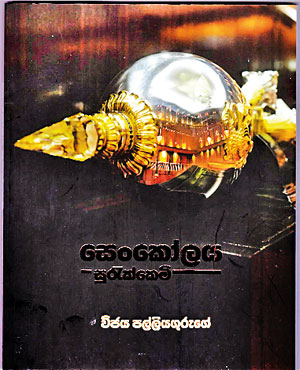News
New book reveals sorcery in Premadasa-era parliament
 President Ranasinghe Premadasa used Malayali sorcery to consolidate his power four years before his 1993 assassination, according to a new book published by a key official who was at the top-secret ritual in parliament.
President Ranasinghe Premadasa used Malayali sorcery to consolidate his power four years before his 1993 assassination, according to a new book published by a key official who was at the top-secret ritual in parliament.
Less than a handful of officials, including the officer-in-charge of the parliament police, shielded the elaborate black magic carried out in the chamber of the House and outside at the dead of night, ostensibly to “bless all members of parliament.”
The sorcerer and his assistant were smuggled into the parliament complex in the OIC’s vehicle which was not subjected to any security checks a few weeks before the 1989 inauguration of parliament by the newly elected President Premadasa.
Among those chosen to keep an eye on the charmer duo was Vijaya Palliyaguruge, who later retired as Serjeant-at-Arms. In his memoirs,
““ (I Protected the Mace),
published this week,
Mr. Palliyaguruge recounts this and other anecdotes of real stories behind speculation and rumour.
Mr. Palliyaguruge recalls how the Malayali sorcerer asked for a golden sword to dig a hole inside the parliament complex to place an oil lamp in it. However, he says, it was not possible to find even a kitchen knife at that ungodly hour. Instead, they produced some other sharp object to scoop out a hole.
The chanting Malayalis cut limes at every corner of the sprawling building and paid keen attention to the chairs of members of parliament. The possessed chief shaman sliced more limes at some chairs, suggesting they could be seats of key opposition figures.
The challenge for parliament staff was to get the charmers and their paraphernalia, including ash plantains, pumpkins and three sacks full of sliced limes out of the complex before first light and dump the evidence in the Kelani River at a location in Kaduwela.
It is possibly the only known occasion when sorcery and black magic were used at the Sri Lankan legislature, but it didn’t prevent President Premadasa facing an impeachment two years and seven months later. However, rumours at the time that Mr. Premadasa used sorcery again to defeat the impeachment are untrue, according to Mr. Palliyaguruge.
When Mr. Premadasa prorogued parliament to head off the impeachment and re-summoned the assembly, staff found white dust on the red carpet of parliament. That fuelled the speculation of sorcery.
Three decades later, Mr. Palliyaguruge reveals that the white dust was actually from white chalk sticks he had to use to mark the exact location where Mr. Premadasa was supposed to stand, where the pots of plants and flowers were to be kept.
Mr. Premadasa was a stickler for perfection and visited the parliament complex a day earlier to work out the positions of people at the inauguration ceremony. He even marked the place for the vase of flowers on the Speaker’s table.
However, cleaning staff of parliament spoke about the white dust they had noticed and it went even to the then opposition leader Sirima Bandaranaike who told international journalists that Mr. Premadasa had rubbed charmed oil and sprinkled human ash in parliament to ward off the impeachment!
Palliyaguruge has put together an extremely readable and gripping 31 chapters in his memoirs that not only recalls some of the historic events in the legislature, but also some facts about the new parliament building many may not have known.
It is clear from the book that Mr. Palliyaguruge, who was the Serjeant-at-Arms for 10 years, may have been privy to many more state secrets. At the official launch of the book at the Sri Lanka Foundation on April 1, he revealed that at least 20 other chapters were axed on the advice of former assistant secretary-general of Parliament, the late C. W. Pannila. “There are some things I cannot reveal and I will have to take them to my grave,” Mr. Palliyaguruge said.
He said he had maintained a diary throughout his career, noting events at the end of each day, which had helped him compile this account.
Colossus is parliament
Palliyaguruge was a towering figure, both literally and figuratively, and was seen as a strong ally of the media, although during his tenure, he was scrupulously guarded. At the launch of his book, he demonstrated his political neutrality by not inviting a single politician except D. E. W. Gunasekara, a Communist Party stalwart who had encouraged him to write the book. Mr. Gunasekera is the first old boy of the Vijitha Madhya Maha Vidyalaya, Dickwella where Palliyaguruge also studied. There were many journalists invited apart from Parliament Secretary-General Dhammika Dassanayake and three of his predecessors, Nihal Seveniratne, Dhammika Kitulgoda and Priyani Wijesekera.
Serjeant-at-arms Palliyagurgue was not just a friend of the media, but he also treated them as MPs. After all, journalists are “Members of the Press (MPs)” he would often say while opening his office and its facilities to parliamentary reporters and the occasional visiting foreign correspondent.
The Sinhala language book is available at Sarasaviya Book shop and is priced at Rs. 950.


